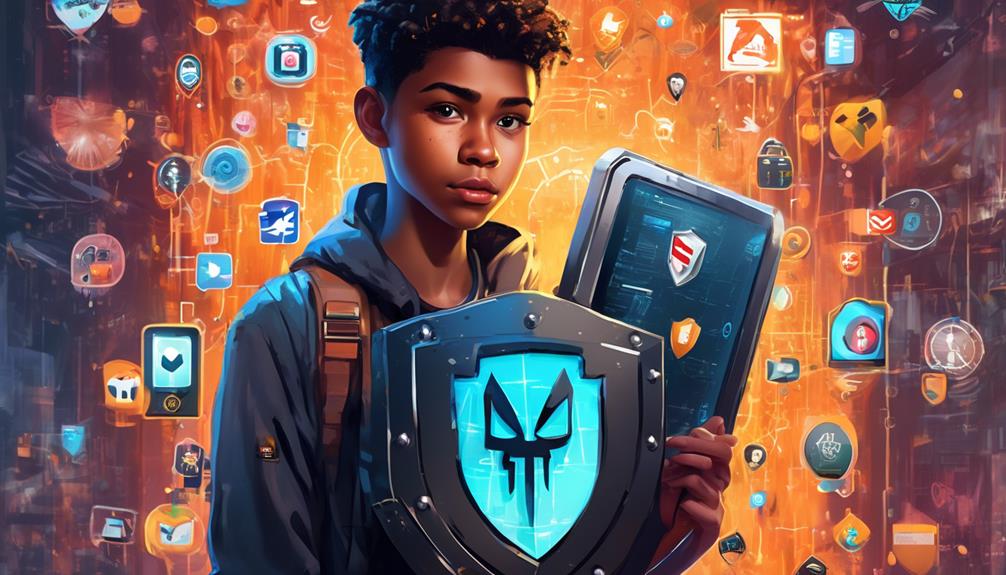In today's complex digital world, teen students are like explorers in uncharted territories online. It is crucial to prioritize cybersecurity tips for these young adventurers, given the numerous online threats. As technology becomes more integrated into their daily lives, it is not just advisable but essential to equip teens with the knowledge to protect themselves in the digital realm.
Importance of Cybersecurity Education for Teens

Implementing early cybersecurity education empowers teens to make informed online decisions and prevent cyberbullying and harassment. High school students greatly benefit from learning about online safety, protecting personal information, and preventing cyber attacks. Given the increasing prevalence of social media and online interactions, it's vital for teens to grasp the importance of safeguarding their personal information and recognizing potential threats. Moreover, cybersecurity education equips teens with the knowledge and skills to navigate the digital landscape responsibly. It instills an understanding of cybersecurity principles, enabling teens to actively contribute to creating a safer online environment for themselves and their peers. Additionally, this education fosters a sense of digital citizenship, encouraging teens to engage with technology in a conscientious and secure manner.
Common Cyber Threats Faced by Teenagers
Adolescents, with early cybersecurity education, should be mindful of common online threats. Phishing is a prevalent danger, involving deceptive emails or messages aiming to obtain personal information. Caution is crucial to avoid sharing sensitive details. Cyberbullying is another significant concern, requiring awareness of online harassment and the importance of reporting such incidents for online security. Social engineering tactics manipulate individuals into divulging personal information or granting access to confidential data. Students must recognize and resist such manipulative techniques for online security. Identity theft risk underscores the need to safeguard personal information and prevent unauthorized use. The threat of malware and viruses emphasizes the importance of caution when downloading from untrustworthy sources and utilizing reliable antivirus software for online security.
Practical Cybersecurity Tips for Teen Students

Teen students should prioritize online security by following practical cybersecurity tips tailored to their digital needs. These tips are crucial for responsible digital behavior and safeguarding personal information.
Use strong, unique passwords for online accounts and enable two-factor authentication where possible. This helps prevent unauthorized access and enhances security.
Exercise caution when sharing personal information online. Verify the authenticity of websites and apps before providing any details. This ensures protection against identity theft and fraud.
Avoid clicking on suspicious links or downloading attachments from unknown sources. This helps prevent malware and phishing attacks that can compromise personal and financial information.
Regularly update devices, software, and apps to patch security vulnerabilities. This helps protect against potential cyber threats, maintaining network security and data integrity.
Role of Schools in Teaching Cybersecurity to Teens
Schools have a crucial role in teaching teens cybersecurity for responsible and secure online navigation. As technology becomes increasingly prevalent in education, schools must ensure students grasp online protection. This includes understanding secure WiFi connections, safe online behaviors, and the importance of strong passwords. Schools can also host workshops and seminars with cybersecurity professionals to provide real-world examples. Hands-on activities can demonstrate the relevance of cybersecurity in students' daily lives. Educational programs like Hacker High School and Cyber Security for Beginners offer accessible resources. Integrating cybersecurity into the curriculum empowers teens to navigate the digital world confidently.
Building Responsible Online Behavior in Teens

As technology becomes more integrated into education, it's vital to teach teens responsible online behavior. Educators and parents can focus on cybersecurity concepts, such as educating teens about the value of personal information and its potential consequences. They should also teach teens to use privacy and security settings on social networks and be cautious when sharing personal information. Additionally, they should encourage teens to understand and use secure Wi-Fi connections and be mindful of their online presence to protect themselves from potential threats. Providing resources and programs tailored to teens can also engage them in learning about online safety and cybersecurity.
Frequently Asked Questions
Why Is It Important for Students to Learn About Cybersecurity?
It is crucial for students to learn about cybersecurity as it raises awareness about digital dangers. Additionally, it promotes protection in the online world, ensuring their safety and well-being.
Why Is It Important for Youth to Ensure Cyber Safety?
It is essential for young people to prioritize cyber safety. This empowers them to navigate the digital world responsibly by understanding online privacy, digital citizenship, and cyber threats. These skills are crucial for ensuring internet safety.
Why Is It Good to Study Cyber Security?
Studying cybersecurity is beneficial because it imparts knowledge about online privacy, defends against digital threats, and safeguards personal data. Additionally, it helps prevent cyber attacks and promotes internet safety, empowering individuals to navigate the digital world securely.
What Are the Cyber Security Tips for Children?
Adolescents can enhance online safety by utilizing parental controls, implementing password protection, and managing social media privacy. Additionally, they should remain vigilant against phishing attempts. These strategies enable them to responsibly navigate the digital realm and shield themselves from cyber threats.
Conclusion
In conclusion, disregarding online safety and personal information protection is unwise. Cyber threats are prevalent, especially for teens. Furthermore, ignoring future career prospects in cybersecurity is shortsighted. It's essential to prioritize learning cybersecurity tips.



